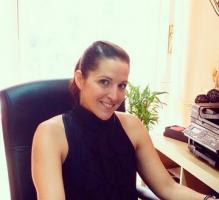Lara Tormo: "Mental flexibility is key when coping with suffering"
If something characterizes the human being, it is the ability to adapt to new situations, unexplored environments, etc. It is, in part, what has allowed us to develop great civilizations. However, this capacity for psychological flexibility is, at the same time, something that is complex to understand, precisely because it constantly changes according to context, culture, etc.
To better understand this phenomenon, we interview the psychologist Lara Tormo, who tells us about the implications that mental flexibility has in a crisis situation such as the pandemic of the coronavirus.
- Related article: "The psychology of creativity and creative thinking"
Interview with Lara Tormo: mental flexibility in times of COVID-19
Lara Tormo is a Health Psychologist with a consultation in Las Palmas de Gran Canaria, and works primarily serving adults and adolescents in face-to-face or online therapy sessions. In this interview he talks to us about the importance of knowing how to adapt ourselves psychologically to the challenges that the coronavirus crisis has brought with it.
What do we mean by mental flexibility, exactly?
Mental flexibility is the ability to be in the present moment, thus being able to attend to all the nuances of the here and now in order to adapt to circumstances. It carries an attitude of openness to experience and kindness without any judgment.
Getting rid of judgments is complicated because really the positive part of it is that we makes the world easier when it comes to classifying and ordering the enormous information we receive. But the negative side of this is that we presuppose aspects that perhaps are not, due to the fact of saving energy and that means that we do not attend to all the nuances.
Inflexibility is governed by the craving we experience when we want things to be a certain way. And we are not able to see further, we anchor ourselves to our perfect idea of what something would be like and paradoxically this takes us away from how beautiful is happening at that moment.
If we do not worry about having that hygiene of the moment, we will be without peace for a lifetime, trying to fight and going against the tide.
How is it related to the concept of resilience?
The resilience It is the ability of a person to face adversity through positive behaviors in the face of stress, threat or conflict.
People who adapt to change are more resilient because they do not have specific goals. And, if they do, if they don't, they are able to take perspective and reformulate their new goals, adapting to the new reality.
Resilience has to do with believing that what one is going to do will have an effect on the environment or in which certain things happen. In contrast, people who have been created in disabling environments will not have the feeling of control about the environment and will have a self-concept of not having the ability to make things change.
Although resilience is a skill very forged by the way and environment in which we have been raised, it is equally trainable. For this, it is necessary to make an effort to direct attention to those things that we are achieving by ourselves, in order to build the feeling that we can change the environment and have an effect on it. same.
How does it affect our mental balance when we do not have cognitive flexibility?
I would dare to say that directly to unhappiness, to suffering. This suffering can be expressed in different ways and it is when we observe in consultation, different symptoms and problems, but deep down it is the same suffering.
Suffering appears when a belief (both positive and negative) is perpetuated and entrenched. A person who thinks he is the best person in the world is just as harmful ( narcissistic personality), such as one who thinks he is the worst person in the world (low self-esteem or depression).
Faced with a crisis such as the coronavirus, what aspects of mental flexibility do you find most relevant?
This point seems interesting to me because I do not believe that COVID-19 is the "culprit" of all the emerging pathologies. I simply believe that what we already carried inside has been exacerbated... And also this adds to the inability to adapt to this new reality. The high incidence of mental disorders in recent months I think is due to both physical and mental resistance that we usually put to new changes.
The complaining internal dialogue is what is usually the order of the day in these times, "what a year", "they lock us up", when yes we stop to think... for once in our life, for a period of time everything stopped, what a great gift to have time for one same! But we are not used to being with ourselves, to enjoying solitude, time to do leisure activities that one likes, or even finding new ones (because they had to be within home).
Instead of attending to the positives of the moment, we complain about the premeditated idea we have of how life has to be, full of work and without holes for us.
And in the cases in which it is necessary to go to psychotherapy in order not to be overwhelmed by this pandemic context, how does mental flexibility participate in the progress of treatment?
It is one of the key pieces to better cope with suffering. We usually have a hard time because our decisive mind tells us to run away from what causes us fear and pain. But what matters to us hurts us and, if we flee from the feeling of vulnerability, we will also flee from what matters to us. It seems like a simple idea, but it goes against our programming and instincts.
If someone who goes to therapy, they are in a certain way approving of going into everything that scares them. Then this is how the path of looking inward and relaxing those patterns of behavior that are making you suffer will begin.
The therapy process involves paying attention to our thoughts with curiosity, opening ourselves to our emotions, attending to what is in the present, learn from the art of taking perspective, discover our deepest values and build habits based on what is truly we want.
Are there aspects of the culture we live in that discourage this kind of adaptation and psychological flexibility in the face of challenges, or directly punish those who go outside the norm of somehow?
From education we are educated to follow a certain orderly pattern in which, whoever goes outside the norm, is rare... when I think the opposite is true. But in a certain part that organization and order is convenient on many occasions.
What habits are useful to enhance mental flexibility on a day-to-day basis?
It is a skill that requires continuous practice if it is not acquired. And it depends on six skills that are fully trainable.
First of all, you have to train the ability to not identify with your own thoughts (Defusion). The problem when we merge with our own thoughts is that we believe them 100%, it affects our emotions and therefore our behaviors. And worst of all, is that, in the long run, as human beings we have concluded that we are our thoughts, and only that. When we really are much more than that if we pay attention to other aspects of our body (body sensations, breathing, etc.).
Second, I believe the development of a contextual perspective of the self is important. Because many times we attribute characteristics as if they were innate to us... and immovable. When we really are like that because of the environment in which we have grown up or with which we are interacting. We suffer less when we are aware that we react in certain ways, in a certain part, to "be a victim" of our past... and not because we have consciously chosen to do so. This is how we forgive, accept, and can change.
I also believe it is important to have an acceptance process. When I say acceptance I do not mean to give up, but rather to go against who one is. From the acceptance it is from where only true change can be produced because responsibility is assumed. When we are not aware of this, we are unconsciously avoiding what we do not like constantly and we are anchored in a dead end loop.
Working on presence is very important to use the mind as if it were a flashlight focused inward and not outward. With this, we try to attend to all the bodily sensations of that moment, establish the focus of attention and also open the focus to aspects that we are not used to notifying. Practice meditation or mindfulness to be present in the here and now. Otherwise, we anchor our mind in worries of the past or worrying anticipations of the future, aspects that go hand in hand with suffering.
One of the last requirements to be able to have mental flexibility is to be clear about your own values and to set goals in relation to them. When we are not aware of them, because we have not questioned them, our life is governed by the "must"; which are rigid rules of operation that we impose on ourselves, but they don't really make us happy. These come from the history that you have lived, the environments in which you have grown up and the expectations that have been created in you. And if we stop acting because of a "must", we feel bad because it is the way in which we have learned to act automatically and unconsciously. On the other hand, the values on the other hand, are chosen freely and therefore, are per se, more flexible.
Finally, committed action is essential because without actions there are no changes. You have to insert new habits of routines to be able to get where you want to go. In order to try new aspects and get out of the hermetic and inflexible behavior pattern.


